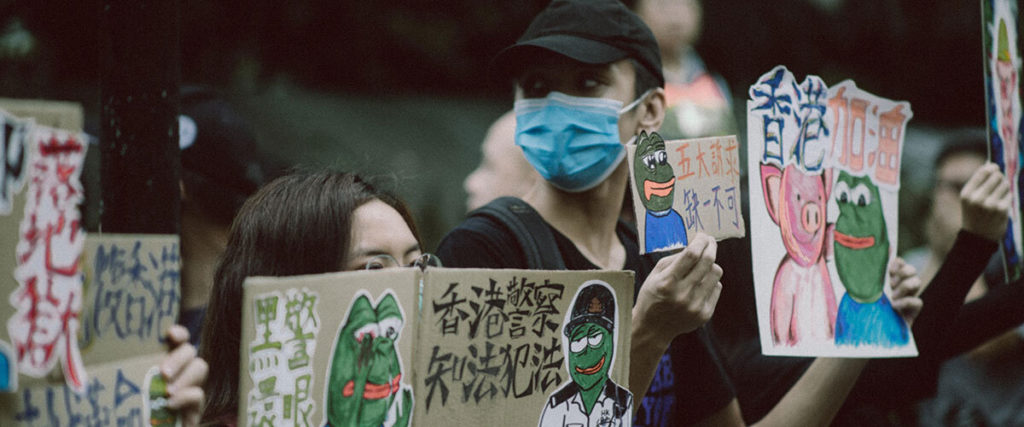Hong Kong’s National Security Law came into effect on Tuesday night – the eve of 1 July, the 23rd anniversary of the HKSAR establishment day, despite widespread controversy.
Bypassing normal democratic processes, the legislation was fast-tracked by the National People’s Congress (NPC), China’s parliamentary body after months of political turmoil. Thousands took to the streets to protest the following day, in defiance of the new law, and over 300 individuals were arrested.
The law criminalises acts that “endanger national security”, targeting acts of “secession, subversion, organisation and perpetuation of terrorist activities” and foreign interference according to Article 1. Offenders, if convicted, could be sentenced to life imprisonment. In the event of a “major and imminent threat to national security” or a complex case involving foreign interference, the National Security Law also gives a specially appointed body the jurisdiction to exercise mainland Chinese laws within the autonomous region.
Hong Kong Chief Executive Carrie Lam stated in a press conference yesterday, “The purpose of this piece of legislation is not just to punish, it is also to deter people from committing such serious offences as secession, subverting the state power, terrorist activities and so on. So deterrence is very important.” The government has repeatedly stressed that the law would only affect a small percentage of the city’s population.
However, the law has been criticised for being excessively broad and vague, opening up opportunities to criminalise peaceful protests, possession of pamphlets advocating Hong Kong independence, and any criticism of the government, journalistic or otherwise. “No government should invoke national security as a justification for repression,” Sophia Richardson, Human Rights Watch China Director, said of the bill earlier this month.
Fears have been raised that the law will increase self-censorship and dampen freedom of speech. Pro-democracy figureheads Joshua Wong, Nathan Law, and Agnes Chow withdrew from Demosisto, the political party they had founded, on Tuesday, winding up the organisation shortly after. Hong Kong National Front and Studentlocalism, both which advocate Hong Kong independence, also shuttered their local operations in light of the new legislation.
The dramatic shift in Beijing’s approach to tackling Hong Kong’s constitutionally-granted autonomy has raised significant concerns among business executives, academics, and human rights organisations. Multiple international firms have begun drawing up contingency plans to relocate to neighbouring cities, such as Singapore, Tokyo or Taipei, citing growing uncertainties regarding the city’s data security and autonomy.
Hong Kong’s deteriorating international status has also prompted the US to impose trade sanctions on sensitive military exports. “We can no longer distinguish between the export of controlled items to Hong Kong or to mainland China,” Secretary of State Mike Pompeo stated in a press release on 29 June. “We cannot risk these items falling into the hands of the People’s Liberation Army, whose primary purpose is to uphold the dictatorship of the CCP by any means necessary.” The US House of Representatives unanimously passed the Hong Kong Autonomy Act on Wednesday, which will impose further sanctions to penalise banks that work with Chinese officials, although the bill still requires Senate approval.
Internationally, the UK has condemned Beijing’s top-down decision to impose the National Security Law, with Prime Minister Boris Johnson calling the move a “clear and breach” of the 1984 Sino-British joint declaration. The UK has offered three million Hong Kong residents who possess a British National Overseas (BNO) passport the right to live and work in the UK for five years, and the subsequent ability to apply for citizenship.
The United States House of Representatives has also put forward a bipartisan bill on Wednesday that would create an asylum route for Hong Kong residents with a ‘well-grounded fear’ of political persecution. The Hong Kong Safe Harbour Act would classify Hong Kong residents as Priority 2 refugees, permitting them to apply directly to the U.S. Refugee Admissions Program, and not count them against the Trump Administration’s refugee limit.
Australia has announced it will follow suit in offering Hong Kong residents support to leave the region if they so wish, although the exact details have yet to be ironed out.
In the longer term, the city’s socio-political and economic future remains uncertain. Proponents of the law advocate the stability that the law will bring to the region, attracting international talent. The Hong Kong government has also recently signed a USD 6.3 million PR contract in a major effort to rebrand the city’s tarnished international image. However, the law – and Beijing’s top-down implementation thereof – marks a major departure from the autonomy that Hong Kong has traditionally enjoyed, and may serve to erode the city’s already flagging reputation.
Additional reporting by Stephanie Halloway.
Related Articles
VPN Downloads Surge in HK After Proposed Security Law Raises Alarms
Over 2 Million Hong Kong Residents Register for Cash Payout Scheme
COVID-19 Impact: 49% of Hong Kong Employees Are Actively Job Hunting





